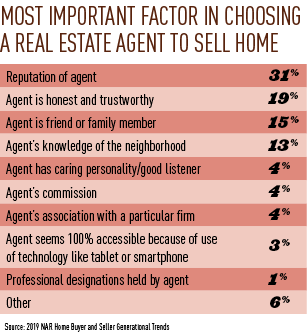5 trending practices that are raising eyebrows and ethical issues
By Matt Alderton
Everyone knows the famous mantra, “Location. Location. Location.” But real estate isn’t just about where you do business. It’s also about how you do business.
So argues John C. Stark, CRS, broker associate at Iowa Realty in West Des Moines, Iowa. A former U.S. Air Force intelligence officer, he left active duty in 2004 to become a REALTOR® and a reservist. Almost immediately, he found that serving his clients looked a lot like serving his country.
“Clients are going through dissolutions of marriages, deaths in the family, illnesses, and job losses. At the same time, they’re getting promotions, having more children and buying vacation homes,” Stark says. “It became clear to me very early that if we don’t follow the rules and do the right thing for people—even when it’s against our own self-interest—our reputation is going to be shot.”

It reminded Stark of his Air Force officer training, during which he learned a version of a common military honor code whose signatories promise not to “lie, cheat, steal, nor tolerate those who do.”
“A general came in to talk to us about ethics,” he says. “At the end of the day, he said, there are only three things you need to remember [to be an ethical military officer]: First, can you explain your actions on CNN? Second, is it the right thing to do? And third, can you explain it to your mother?”
Because ethical issues are often ambiguous, REALTORS® need tools to navigate them. Sometimes, those tools are internal, like the gut-check questions Stark learned in the military. Other times, they’re external, like the National Association of REALTORS® Code of Ethics and Standards of Practice, which was adopted in 1913 and now includes 17 articles encompassing REALTORS®’ duties to clients, the public and each other.
“The Code of Ethics is what differentiates us as REALTORS®,” says Kim Cameron, CRS, broker associate at Better Homes & Gardens Real Estate Preferred Properties in St. Louis.
And yet, Codes of Ethics are only as effective as the professionals who live by them. The onus is therefore on REALTORS® to ensure that professional standards do as much good in practice as they do in principle.
Ethical advantages
The best reason for ethical behavior is simple: It’s the right thing to do. But that’s not the only reason. Consider, for instance, the results of NAR’s 2019 Home Buyers and Sellers Generational Trends Report. Based on a survey of more than 7,000 recent homebuyers, “honesty and integrity” is the No. 1 most important quality buyers look for in real estate agents.
“We would all like to have repeat business and referrals,” says Stark, who recalls the famous quote of a local businessman: I would rather have one customer 100 times than 100 customers one time. “You can’t get those if you’re not trustworthy.”
Nor can you accomplish deals for the clients you already have. “If you act unethically, other agents will not be inclined to work with you or show your listings,” Stark says. “That’s going to make your business a lot more difficult.”
Of course, it’s not just your reputation at stake. It’s that of the entire profession, suggests a 2018 poll by Gallup, which found that most Americans (54%) rate real estate agents’ ethical standards as only “average.”
“Behaving ethically is in the best interest of our clients, but it’s also in the best interest of the profession,” says Maura Neill, CRS, founder of Buy Sell Live Atlanta, her team with RE/MAX Around Atlanta in Alpharetta, Georgia. “All of us are stewards of our industry’s reputation.”
New and growing challenges
REALTORS® should be intimate with the 17 articles that constitute NAR’s Code of Ethics and Standards of Practice. Just as important, however, is being cognizant of ethical issues that are trending in one’s local market. Here, for example, are just a few of the present-day practices that are raising eyebrows for CRSs in their communities:
Trespassing—entering listings without permission—is a rampant problem in her market, Neill says. “A lockbox on the door or a sign in the yard is not an open invitation to let yourself in,” she says, pointing out that trespassing agents can unknowingly trip alarms—some of which automatically call the police—or walk in on unsuspecting homeowners, even when the home is presumed vacant. “You don’t enter a property without first obtaining permission from the owner. First, it’s a criminal act. And second, it’s just bad manners.”
Defamatory and libelous speech on social media are growing concerns for Kay Hunt, CRS, managing broker at Imagine Homes Realty and chair of professional standards for the Clark County Association of REALTORS® in Vancouver, Washington. “I see REALTORS® posting negative comments about other REALTORS®. That to me is a real issue,” says Hunt, who cites Article 15 of the NAR Code of Ethics, which says, “REALTORS® shall not knowingly or recklessly make false or misleading statements about other real estate professionals, their businesses or their business practices.” “Social media can be risky; people need to be careful about what they say.”
The “procuring cause” of real estate transactions—the agent who’s responsible for a buyer’s purchase, and therefore deserves the commission—is an ethical quagmire in many markets, according to Stark, who often sees agents approaching prospects at open houses without asking whether they’re already working with an agent. “Buyers have a right to decide who they want to work with, but agents have a professional obligation to respect one another’s [exclusive representation agreements],” Stark says.
Failure to disclose deficiencies is another frequent ethical dilemma. “What I’m seeing more often is that a buyer’s agent discovers a real or perceived material deficiency and the seller’s agent says the seller ‘doesn’t want to know.’ Once anyone knows of a material defect, all parties are required to disclose it,” says Stark. On a similar note, he recalls a recent discussion on social media during which a REALTOR® asked advice about whether to disclose that a home had been the scene of a homicide. “It was shocking to me how many people said, ‘Don’t do anything; you have no duty to disclose.’ While that’s true in my market—we don’t have to disclose what’s called a ‘stigmatized property’—it may be the right thing to do.”
Article 1 of the NAR Code of Ethics states that REALTORS® are obligated to “protect and promote the interests of their client,” including submitting all offers to sellers. Unfortunately, agents don’t always heed this responsibility. One time, for instance, Cameron recalls submitting an offer on a Friday and not receiving a response from the seller’s agent until Monday afternoon with multiple attempts to reach the agent. She found out the seller had already accepted another offer. “Turns out [the seller’s agent] was a dual agent; he ignored our offer so he could sell it to somebody else and make more money.”
New and Growing Challenges
REALTORS® should be intimate with the 17 articles that constitute NAR’s Code of Ethics and Standards of Practice. Just as important, however, is being cognizant of ethical issues that are trending in one’s local market. Here, for example, are just a few of the present-day practices that are raising eyebrows for CRSs in their communities:
1. Trespassing
Trespassing—entering listings without permission—is a rampant problem in her market, Neill says. “A lockbox on the door or a sign in the yard is not an open invitation to let yourself in,” she says, pointing out that trespassing agents can unknowingly trip alarms—some of which automatically call the police—or walk in on unsuspecting homeowners, even when the home is presumed vacant. “You don’t enter a property without first obtaining permission from the owner. First, it’s a criminal act. And second, it’s just bad manners.”
2. Defamation
Defamatory and libelous speech on social media are growing concerns for Kay Hunt, CRS, managing broker at Imagine Homes Realty and chair of professional standards for the Clark County Association of REALTORS® in Vancouver, Washington. “I see REALTORS® posting negative comments about other REALTORS®. That to me is a real issue,” says Hunt, who cites Article 15 of the NAR Code of Ethics, which says, “REALTORS® shall not knowingly or recklessly make false or misleading statements about other real estate professionals, their businesses or their business practices.”
“Social media can be risky; people need to be careful about what they say.”
3. Procuring Cause
The “procuring cause” of real estate transactions—the agent who’s responsible for a buyer’s purchase, and therefore deserves the commission—is an ethical quagmire in many markets, according to Stark, who often sees agents approaching prospects at open houses without asking whether they’re already working with an agent. “Buyers have a right to decide who they want to work with, but agents have a professional obligation to respect one another’s [exclusive representation agreements],” Stark says.
4. Nondisclosure
Failure to disclose deficiencies is another frequent ethical dilemma. “What I’m seeing more often is that a buyer’s agent discovers a real or perceived material deficiency and the seller’s agent says the seller ‘doesn’t want to know.’ Once anyone knows of a material defect, all
parties are required to disclose it,” says Stark. On a similar note, he recalls a recent discussion on social media during which a REALTOR® asked advice about whether to disclose that a home had been the scene of a homicide. “It was shocking to me how many people said, ‘Don’t do anything; you have no duty to disclose.’ While that’s true in my market—we don’t have to disclose what’s called a ‘stigmatized property’—it may be the right thing to do.”
5. Dereliction of Duty
Article 1 of the NAR Code of Ethics states that REALTORS® are obligated to “protect and promote the interests of their client,” including submitting all offers to sellers. Unfortunately, agents don’t always heed this responsibility. One time, for instance, Cameron recalls submitting an offer on a Friday and not receiving a response from the seller’s agent until Monday afternoon with multiple attempts to reach the agent. She found out the seller had already accepted another offer. “Turns out [the seller’s agent] was a dual agent; he ignored our offer so he could sell it to somebody else and make more money.”
The NAR Code of Ethics includes 17 articles governing REALTOR® interactions with clients, the public and each other. To read it in its entirety, visit 2019 Code of Ethics & Standards of Practice.
Protecting the profession
Whatever the violation, there typically is only one way to resolve it: report it.
“We as REALTORS® have to self-police our profession,” Hunt says. “If we see something we feel may be unethical or unprofessional, it’s our responsibility to report it.”
The question is: to whom? Start with the offending agent directly, Cameron suggests. “Most of the time when I see bad behavior, it doesn’t warrant a formal complaint. Instead, it’s an opportunity to have a friendly conversation and help that person be better in their business and a better REALTOR®,” she says.
If you can’t reach the agent, or they’re unreceptive, consider elevating it to their managing broker. “We all make mistakes, so I’m willing to give agents the benefit of the doubt,” Neill says. “I’ll often call the broker and—without being accusatory—say, ‘I think this is an educational opportunity.’”
REALTORS® also can turn to the ombudsman at their local or state association, whose job is to help parties resolve disputes when communication breaks down between them.
“I think ombudsman programs are underused,” Hunt says. “It can be a good avenue for dealing with a problem before it gets overblown.”
When all else fails, it’s time to file a formal complaint with the Grievance Committee of your local or state association.
“Especially in smaller markets, a lot of REALTORS® are afraid to take this step because they think to themselves, ‘What if I have to work with this person again?’” Neill says. “I understand that concern. But if we’re too afraid to report infractions when we see them, we might as well not have a Code of Ethics in the first place.”
Have you encountered an ethically questionable situation? Run it past your peers in our Facebook group, We Are CRS. Your fellow CRSs are here to help!








